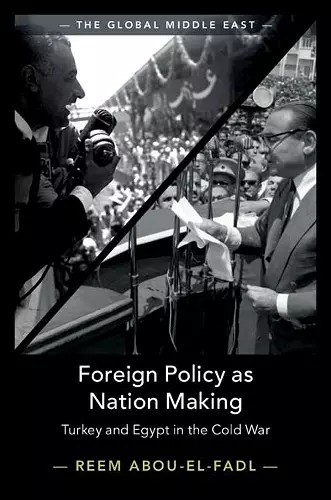Foreign Policy as Nation Making
Turkey and Egypt in the Cold War
Format:Hardback
Publisher:Cambridge University Press
Published:13th Dec '18
Currently unavailable, and unfortunately no date known when it will be back
This hardback is available in another edition too:
- Paperback£36.99(9781108468442)

This insightful work explores the contrasting foreign policies of Turkey and Egypt in the 1950s, revealing how their nation-making projects shaped their international strategies.
In Foreign Policy as Nation Making, the author delves into the intricate foreign policies of Turkey and Egypt during the 1950s, a period marked by significant geopolitical shifts. The Turkish Democratic Party's pursuit of NATO membership and its support for the pro-Western Baghdad Pact starkly contrasts with the Free Officers in Egypt, who advocated for neutralism and pan-Arab alliances. This divergence raises important questions about the underlying motivations and historical contexts that shaped these nations' foreign strategies.
The book argues that the differences in foreign policy can be traced back to the contrasting nation-making projects of the two leaderships. After World War II, both Turkey and Egypt emerged as influential players in the Middle East, yet their paths diverged based on their unique experiences of war, imperialism, and underdevelopment. By rethinking foreign policy as a crucial element in realizing nationalist aspirations, the author highlights how local actors navigated their quests for sovereignty and belonging on the international stage.
Utilizing untapped Turkish and Arabic sources, Foreign Policy as Nation Making critically engages with postcolonial nationalism theories. The analysis not only illuminates the historical legacies of the 1950s but also provides insights into how these legacies continue to influence Turkey's alignment with the Western Bloc and Egypt's identity as a leader in the Arab world. Ultimately, the book offers a nuanced understanding of the interplay between foreign policy and nation-building in a complex historical context.
'Reem Abou-El-Fadl's fine comparative study of Egyptian and Turkish foreign policy in the early Cold War throws penetrating new light on how foreign policy can serve national development strategies in LDCs [Least Developed Countries]. Using an innovative theoretical framework that links theories of IR [International Relations] and nationalism, it also breaks new theoretical ground that can be usefully applied to other cases.' Raymond Hinnebusch, University of St. Andrews
'This historically grounded, empirically rich and thoroughly comparative analysis of the interplay between foreign policy-making and national self-fashioning in Egypt and Turkey during the 1950s offers a challenging new perspective that scholars of international relations and comparative politics would do well to engage with.' Zachary Lockman, New York University
'In this empirically rich and theoretically sophisticated study, Reem Abou-El-Fadl shows that the diametrically opposed positions Egypt and Turkey assumed vis-à-vis the west in the 1950s derived directly from their respective projects of nation making. El-Fadl's book is an essential reading for anyone who wants to understand the link between domestic and international politics in Global South, both in the twentieth and in the twenty-first century.' Resat Kasaba, University of Washington
ISBN: 9781108475044
Dimensions: 235mm x 157mm x 21mm
Weight: 730g
384 pages